- Latest News
- Jawazat and MOI
- Driving in KSA

- Punishments

Can unmarried couples stay in hotels in Saudi Arabia?
Many unmarried couples ask if they can live together as boyfriend, girlfriend in a hotel as per the new rules in Saudi Arabia. The implication is different for Saudis, expats, and tourists.
Unmarried Saudi couples
Unmarried Saudi couples are not allowed to live together under one roof, neither they are allowed to share a hotel room in KSA.
- At the time of checking into a hotel, the hotel management is required to obtain the Saudi National IDs of the couple and ensure that the Mahram relation exists between them.
- At the time of renting out an apartment, the landlord is required to ensure that the Saudi tenant is married if he is planning to keep his family (wife/girlfriend) in the apartment.

Unmarried Expat couples
Similarly, unmarried expat couples or Iqama holders are also not allowed to live together in an apartment nor in a hotel room in Saudi Arabia.
- Hotel management and landlord are still required to check their marital status.
- However, being foreigners they are not under the strict radar of the authorities.

Unmarried Tourists couples
According to the new rules applicable in Saudi Arabia, unmarried couples on a tourist visa can live together in a hotel room.
- The hotel management would ask you to provide passport copies. But they are not obliged to check if you are in a marital relationship.
- How to apply for a tourist visa?
- Source: BBC
For the latest updates, you can join our ✅ WhatsApp group or ☑️ Telegram Channel .
Never pay the full price🏷️; join the 📢 Saudi Coupon Codes group and get sales updates and discount codes in one place.
RELATED ARTICLES MORE FROM AUTHOR
Expat arrested for carrying unregistered medicine, expat jailed 10 days for keeping a barking pet dog, saudi jailed for 10 years for keeping 3 lions at home, sr 500k fine for stealing airline or passenger stuff, sr 27,000 fine on 9 expats for doing bbq in a park, indian arrested for receiving drugs parcel through saudi post.
Saudi Arabia: Reforms allow women and unmarried foreign couples to take hotel rooms
Couples previously had to prove they were married before taking a room in the Gulf state, where sex outside marriage is banned.
Tuesday 8 October 2019 04:36, UK
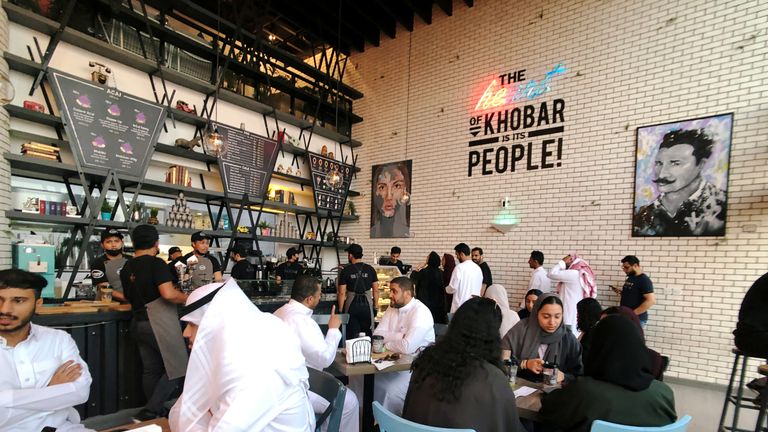
Saudi Arabia is to allow foreign men and women to share hotel rooms without proving they are married.
In a move away from its traditionally strict social code and in order to grow its tourism industry, all women will also be allowed to stay in hotel rooms without a male family member.
Couples previously had to prove they were married before getting a hotel room in the Gulf state, where sex outside of marriage is banned.
Please use Chrome browser for a more accessible video player

Unaccompanied women were banned from doing so.
Last week, the oil-rich nation launched a new tourist visa system for 49 countries to attract holidaymakers and investors in the hope of diversifying its economy away from oil exports.
As part of the move, visitors will not need to wear all-covering black robes, but must dress modestly and alcohol remains banned.
Announcing the changes on Friday, the Saudi Commission for Tourism and National Heritage, said: "All Saudi nationals are asked to show family ID or proof of relationship on checking into hotels. This is not required of foreign tourists.
More on Saudi Arabia

Saudi Arabia's tennis takeover - sportswashing or progress in the country?

Oleksandr Usyk defeats Tyson Fury to become undisputed heavyweight champion of the world

Tyson Fury v Oleksander Usyk: Fight of the century nears as sporting legend struggles to pick winner
Related Topics:
- Saudi Arabia
"All women, including Saudis, can book and stay in hotels alone, providing ID on check-in."
Under its de facto leader Crown Prince Mohammad bin Salman, the traditionally closed country is aiming for 100 million visits a year by 2030.

Last month women were given the right to travel abroad without male consent and in 2018 women were given the right to drive for the first time.
These reforms mark a significant change from the guardianship system that means each woman is assigned a male relative to approve important decisions throughout their lives.

While the changes the prince has ushered in have won him international praise, both his and Saudi Arabia's reputation has been damaged by the killing of journalist Jamal Khashoggi, a crackdown on dissent, and a devastating war in Yemen.

Until now, foreigners travelling to Saudi Arabia have been largely restricted to resident workers and their dependents, business travellers, and Muslim pilgrims who are given special visas to visit the holy cities of Mecca and Medina.
Related Topics
Matador Original Series
Saudi arabia will now allow unmarried foreign couples to rent hotel rooms.
C ouples retreats just got a whole lot easier in Saudi Arabia…if taking a couples retreat in Saudi Arabia is your thing. As part of its new, more relaxed visa program , the famously restrictive country is now allowing unmarried foreign couples to rent hotel rooms together. Previously, couples had to provide documents proving that they were married before renting a room. Women will also be allowed to stay in hotel rooms alone.
According to the Saudi Commission for Tourism and National Heritage, “All Saudi nationals are asked to show family ID or proof of relationship on checking into hotels. This is not required of foreign tourists. All women, including Saudis, can book and stay in hotels alone, providing ID on check-in.” And while female tourists are still required to dress modestly , they are not expected to fully cover up.
More like this
Trending now, saudi arabia launches a new, alcohol-free cruise line, discover matador, adventure travel, train travel, national parks, beaches and islands, ski and snow.
We use cookies for analytics tracking and advertising from our partners.
For more information read our privacy policy .
Matador's Newsletter
Subscribe for exclusive city guides, travel videos, trip giveaways and more!
You've been signed up!
Follow us on social media.
Saudi Arabia Now Allows Unmarried Couples And Solo Female Travelers To Book Hotel Rooms
In an effort to appeal to tourists, Saudi Arabia is now allowing unmarried couples to share rooms while visiting the country.
Kelsey Marie • Oct 10, 2019

For the first time, the Saudi Kingdom will open its country up to mass tourism thanks to the launch of a new tourist visa program.
Prior to this decision, couples had to prove they were legally married before being allowed to share a room.
Although the rules have been lifted for international visitors, nationals of Saudi Arabia still have to be married before being allowed to stay in the same room.
Unmarried foreign couples will now be allowed to rent hotel rooms together in Saudi Arabia as part of a new visa regime announced by the kingdom's government. https://t.co/4jHJP7desE pic.twitter.com/mDA3m7rwnY — InsightScoop.ng (@insightscoopng) October 6, 2019
According to CNN, “The Saudi Commission for Tourism and National Heritage has recently approved the new regulations of tourism accommodations.”
Also for the first time, women traveling alone to Saudi Arabia will be allowed to book hotel rooms. The new visa rules state that solo women travelers will still have to dress modestly at all times.
In the past, international women travelers had to be accompanied by a man in public if they were under 45 years old.
The new laws by Saudi Arabia are being implemented with hopes of bringing in 100 million tourists annually, both international and domestic, by 2030.
The country also has a goal of tourism being a contributor of 10% of GDP.
Currently, the Arab Kingdom is spending billions to build new resorts and theme parks to make it more tourist-friendly.
Subscribe to travel noire
Get more travel content
Subscribe to Travel Noire, a free daily newsletter that features the best of travel, destinations, and guides to the cities you love from a new point of view — yours.
By subscribing to this newsletter, you agree to our terms of service and privacy policy.
Popular posts
Trending stories in world travel
Saudi Arabia to allow foreign couples to rent hotel rooms
Saudi women can rent hotel rooms and foreign unmarried couples can share a room as restrictions eased to boost tourism.
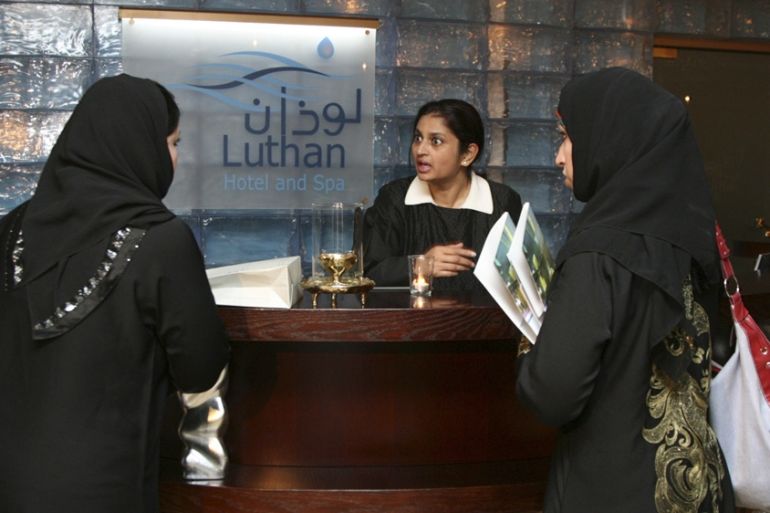
Saudi Arabia has lifted some restrictions on women travelling in the kingdom, with new guidelines allowing women to rent hotel rooms without a male guardian present, and foreign men and women to share a room without proof of marriage.
The easing of stringent regulations governing social interactions comes after Riyadh launched its first tourist visa scheme, as part of efforts to open up the country to foreign visitors and diversify its oil-reliant economy.
The Saudi Commission for Tourism and National Heritage posted the new requirements on Twitter on Sunday, confirming a Friday report by the Saudi daily Okaz.
The commission said women will be allowed to rent hotel rooms with proof of identity – an ID card for Saudi women, residency card for foreign residents living in the kingdom or passport for tourists.
The same would be required of foreign couples, without the need for them to present a marriage certificate. Previously women needed permission from a male guardian to rent a hotel room.
However, unmarried Saudi couples will still need to provide proof of a marital relationship.
“All Saudi nationals are asked to show family ID or proof of relationship on checking into hotels,” the tourism authority said.
Women will also be allowed to rent hotel rooms without any form of identification if they have a male guardian present who does have proof of identity, it said.
The move comes amid deep reforms over the past year by Crown Prince Mohammed bin Salman ( MBS ) which has lifted a ban on movie theatres in the kingdom and the world’s only ban on women driving .
Critics note there are limits to the reforms, and point to last year’s killing of Saudi writer Jamal Khashoggi in the Saudi consulate in Istanbul and the reported torture of several imprisoned women’s rights activists.
A new push for tourism
Last week, Saudi Arabia announced the new tourist visa scheme, saying it was aiming to increase tourism to contribute up to 10 percent of the gross domestic product compared with three percent currently.
For the launch of its new visa, the country was highlighting five UNESCO World Heritage sites, contemporary art sites and natural sites including the Red Sea, desert and mountains.
Previously, visitor visas were issued only for specific reasons such as for Muslim religious pilgrimages, to visit family or for business.
The one-year, multiple-entry visa scheme allows for stays of up to 90 days at a time and marks the first time the country is allowing foreigners to visit solely for the purpose of tourism.
The rules for holidaymakers in Saudi Arabia
Strict laws on hotel bookings for unmarried foreign couples are being dropped as part of bid to boost tourism
- Newsletter sign up Newsletter
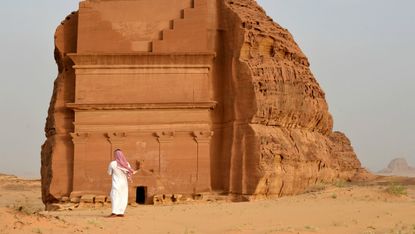
The government of Saudi Arabia has announced that unmarried foreign visitors to the country will now be able to sleep in the same hotel room, as part of an ongoing drive to attract more tourists.
What women can and can’t do in Saudi Arabia
As the BBC notes, the ultra-conservative kingdom previously required men and women seeking to share a room to provide documents proving they were married. Tourists also had to abide by a number of other rules while in Saudi Arabia, including a strict dress code.
But the Saudi Commission for Tourism and National Heritage said on Sunday that a number of these restrictions would no longer apply to foreigners.
Subscribe to The Week
Escape your echo chamber. Get the facts behind the news, plus analysis from multiple perspectives.

Sign up for The Week's Free Newsletters
From our morning news briefing to a weekly Good News Newsletter, get the best of The Week delivered directly to your inbox.
The easing of stringent regulations governing social interactions comes shortly after Riyadh launched its first tourist visa scheme as part of efforts to open up the country to foreign visitors and diversify its oil-reliant economy.
The Independent’s Simon Calder told the BBC: “Vastly simplifying the bureaucracy of obtaining a visa should lead to an immediate surge in visitor numbers - initially, I imagine, from those with an interest in the Arab world and its heritage.”
So what rules are still in place for foreigners?
For years, Saudi Arabia has upheld a strict dress code for foreign women, who were required to wear an abaya - described by Bloomberg News as a “flowing cloak” that covers almost the entire body.
This rule was dropped by the kingdom last month, although the authorities say that women must still wear “modest clothing”.
Couples sharing bedrooms
Until this week, all couples were required to present proof of marriage before checking into a hotel together - a rule that has now been dropped entirely for foreigners, who will only need a photo ID in order to check in.
The rule change will not apply to Saudi nationals, however, who will still be required to show proof of marriage if staying with a partner.
Women in hotels
The newly announced reforms also included the lifting of a rule that required women to have a male guardian present in order to rent a hotel room, Deutsche Welle reports.
All women, including Saudis, can now book and stay in hotels alone, after providing ID on check-in.
Last month, Saudi officials announced a new visa programme solely for tourism. Access to the country was previously “largely restricted to resident workers and their dependents, business travellers, and Muslim pilgrims who are given special visas to visit Mecca and Medina”, according to Al Jazeera .
Although Mecca and Medina will still be off-limits for outsiders, the country’s new one-year, multiple-entry visa scheme permits stays of up to 90 days at a time. Citizens of 49 eligible countries can apply online or on arrival, while those from other countries will have to apply at their nearest Saudi embassy or consulate, The Guardian reports. There are no restrictions for unaccompanied women.
LGBT rights
Despite the relaxation of certain rules, other draconian laws remain in place for both Saudi citizens and foreign visitors.
The UK Foreign and Commonwealth Office (FCO) reports that displays of homosexuality “are illegal and can be subject to severe penalties”. LGBT people travelling to Saudi Arabia are “likely to face significant difficulties and risks”, the government department adds.
It is also illegal to be transgender under Saudi law.
Alcohol and drugs
Alcohol is forbidden under Saudi Arabia’s strict interpretation of Islamic law and is almost impossible to get hold of within the kingdom. Foreigners discovered flouting these rules face harsh penalities including possible prison time .
Drugs - also illegal in Islam - are subject to even stricter regulations. The punishment for smuggling drugs includes the death penalty.
Dual citizenship
One of Saudi Arabia’s more unusual laws relates to dual nationality, which the kingdom does not recognise.
The FCO warns that holding two passports in Saudi Arabia is illegal, and that second passports “will be confiscated by the immigration authorities if they’re discovered”.
Sign up for Today's Best Articles in your inbox
A free daily email with the biggest news stories of the day – and the best features from TheWeek.com

The Week Recommends Léa Seydoux is 'majestic' in this adaptation of a novella by Henry James
By The Week UK Published 8 June 24

Talking Point Washington lifts ban on use of US weapons against some military targets inside Russia
By The Week Staff Published 8 June 24

Cartoons Saturday's cartoons - pushover pachyderms, Biden's mental health, and more
By The Week US Published 8 June 24

Why Everyone's Talking About Visitors to the Louvre have dubbed the crowded experience 'torture' as famous landmarks suffer from overtourism
By Chas Newkey-Burden, The Week UK Published 29 April 24

Under The Radar Tensions over tourists taking photographs of iconic Japanese women have reached 'boiling point'
By Chas Newkey-Burden, The Week UK Published 1 March 24

Talking Point Tourists flock to familiar sights from Saltburn, One Day and Emily in Paris, but locals are less than impressed
By Chas Newkey-Burden, The Week UK Published 26 February 24

The Explainer Travelers' fascination with the macabre is not new
By Devika Rao, The Week US Published 29 November 23

Speed Read Protest group complain about ‘foreigners’ and ‘overcrowding’ on island favoured by British holidaymakers
By Jamie Timson Published 18 August 23

Talking Point Booming demand needs to be balanced by greater awareness, oversight and regulation
By The Week Staff Published 26 June 23

Pros and Cons Visitor levies can boost tourism but a lack of transparency troubles critics
By The Week Staff Published 31 March 23

By Brendan Morrow Published 6 December 21
- Contact Future's experts
- Terms and Conditions
- Privacy Policy
- Cookie Policy
- Advertise With Us
The Week is part of Future plc, an international media group and leading digital publisher. Visit our corporate site . © Future US, Inc. Full 7th Floor, 130 West 42nd Street, New York, NY 10036.
- Saudi Arabia Tourism
- Saudi Arabia Hotels
- Saudi Arabia Bed and Breakfast
- Saudi Arabia Vacation Rentals
- Flights to Saudi Arabia
- Saudi Arabia Restaurants
- Things to Do in Saudi Arabia
- Saudi Arabia Travel Forum
- Saudi Arabia Photos
- All Saudi Arabia Hotels
- Saudi Arabia Hotel Deals
- Last Minute Hotels in Saudi Arabia
- Saudi Arabia
- Things to Do
- Restaurants
- Vacation Rentals
- Travel Stories
- Rental Cars
- Add a Place
- Travel Forum
- Travelers' Choice
- Help Center

Hotel room for an unmarried couple - Saudi Arabia Forum
- Middle East
- Saudi Arabia
Hotel room for an unmarried couple
- United States Forums
- Europe Forums
- Canada Forums
- Asia Forums
- Central America Forums
- Africa Forums
- Caribbean Forums
- Mexico Forums
- South Pacific Forums
- South America Forums
- Middle East Forums
- Honeymoons and Romance
- Business Travel
- Train Travel
- Traveling With Disabilities
- Tripadvisor Support
- Solo Travel
- Bargain Travel
- Timeshares / Vacation Rentals
- Middle East forums
- Saudi Arabia forum

Thanks in advance. Would appreciate any advice in reference to travelling as an unmarried couple in Saudi Arabia.
The rulles has been changed few days ago now it's allowed noboday has the right to ask you for marrige certifcate. You are welcome

https://www.bbc.co.uk/news/world-middle-east-49947515
In theory, yes you can...
Please report back your experience of the above changes. Thanks

Look forward to hearing all about it as my partner and I are hoping to do a similar thing next February from London. Where has been the best source of travel advice given the lack of travel guide books?

sjj127, there's a blog here which I find extensive and relevant to visitors like yourself:
https://againstthecompass.com/en/travel-to-saudi-arabia/.
Check out this forum from time to time. You never what kind of gem of information you might unearth here.
Tripadvisor staff removed this post because it did not meet Tripadvisor's forum posting guidelines with prohibiting self-promotional advertising or solicitation.
You are welcome
If you need any help feel free
Is it applicable for all nationalities?
Can apply this to all nationalities even in not tourist visa? Pls enlighten.
- Middle name left of on Saudi Stop over visa 2:05 pm
- Umrah Closed July 12:36 pm
- Order e-sim before I enter Saudia Arabia? 10:21 am
- Kiswa piece 4:30 am
- Any expats living in Riyadh? Can a gay couple live here? today
- Umrah today
- Visiting Saudi Arabia in end October - good time? yesterday
- Umrah after Hajj yesterday
- Eid ul Adha prayer in Makkah Grand mosque Jun 07, 2024
- Jeddah airport bus cheap airport bus to SAPTCO Al Balad area Jun 07, 2024
- Transit Visa for Jeddah /Riyadh for a 11 hours Layover ? Jun 07, 2024
- Missing person report/help in finding my father Jun 07, 2024
- Boarding on domestic flight after arriving on International Jun 07, 2024
- Haramain Train Jun 06, 2024
- Train from Dammam to Riyadh 19 replies
- Westerners, Women,and Life in Riyadh 82 replies
- Road trip to Saudi Arabia 10 replies
- Flying Saudi Arabian Airlines 105 replies
- Electric Plug converter required in Saudi and Bahrain? 2 replies
- Visitor visa for Saudi for Indian citizen :( 2 replies
- living in jazan 27 replies
- Saudi Airlines Domestic Flight! Help! 12 replies
- al jouf 7 replies
- Riyadh & Al Jouf 7 replies
Saudi Arabia Hotels and Places to Stay
- 24 Historical Ziyarat places in Makkah
- Drivers for Jeddah, Makkah & Madina & City Tours
- Zam Zam water carrying on airplane
- Solo trip to KSA?
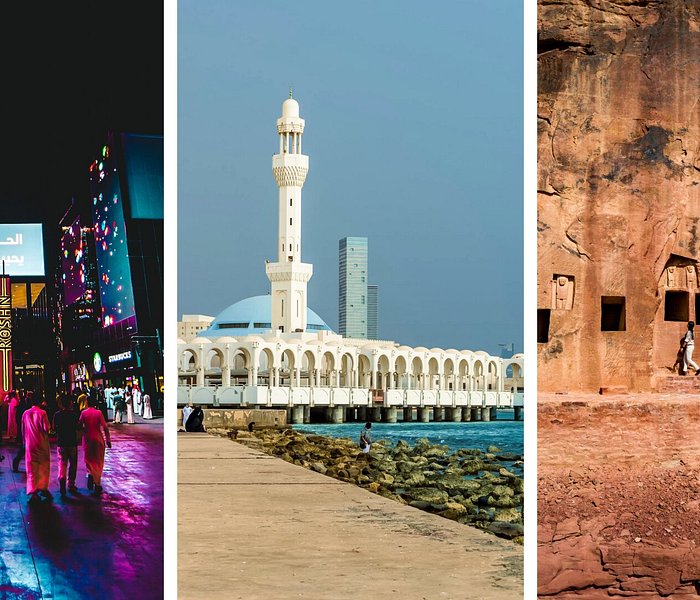
Saudi Arabia will let unmarried foreign men and women share hotel rooms amid massive tourism push
- Saudi Arabia introduced a new tourist visa last week.
- It is now allowing unmarried foreign men and women to rent hotel rooms together, and letting women rent hotel rooms by themselves.
- The moves appear to pave the way for unaccompanied women and unmarried foreigners to travel more easily in the conservative kingdom.
- Visit Insider's homepage for more stories.

RIYADH (Reuters) - Saudi Arabia is allowing foreign men and women to rent hotel rooms together without proving they are related, after the conservative Muslim kingdom launched a new tourist visa regime to attract holidaymakers.
Women, including Saudis, are also permitted to rent hotel rooms by themselves, in a break with previous regulations.
The moves appear to pave the way for unaccompanied women to travel more easily and for unmarried foreign visitors to stay together in the Gulf state, where sex outside of marriage is banned.
The Saudi Commission for Tourism and National Heritage confirmed a report on Friday by Arabic-language newspaper Okaz, adding: "All Saudi nationals are asked to show family ID or proof of relationship on checking into hotels. This is not required of foreign tourists. All women, including Saudis, can book and stay in hotels alone, providing ID on check-in."
Saudi Arabia threw open its doors last week to foreign tourists from 49 countries as it tries to grow that sector and diversify its economy away from oil exports. As part of the move, it decreed that visitors need not wear all-covering black robes but should dress modestly. Alcohol remains banned.
Read more: Saudi Arabia is enlisting Instagram travel influencers to help repair its tattered reputation
Saudi Arabia has been relatively closed off for decades and until recently unrelated men and women, including foreigners, could be severely punished for mixing in public. Strict social codes have been relaxed in recent years and previously banned entertainment has flourished.
But an influx of tourists -- the authorities are aiming for 100 million annual visits by 2030 -- could push boundaries further and risks conservative backlash.
The kingdom ended a heavily criticized ban on women driving last year and in August granted women new rights to travel abroad, chipping away at a guardianship system that assigns each woman a male relative to approve important decisions throughout their lives.
The changes are part of de facto ruler Crown Prince Mohammed bin Salman's ambitious economic and social reform agenda. His plans have received international praise, but his image has been tarnished by the killing of journalist Jamal Khashoggi, a crackdown on dissent, and a devastating war in Yemen.
Until now, foreigners traveling to Saudi Arabia have been largely restricted to resident workers and their dependents, business travelers, and Muslim pilgrims who are given special visas to visit the holy cities of Mecca and Medina.
(Reporting by Stephen Kalin; Editing by Daniel Wallis)
Watch: Why the Saudi crown prince met with Trump, Oprah, Bill Gates, and Jeff Bezos
- Main content
- Personalize
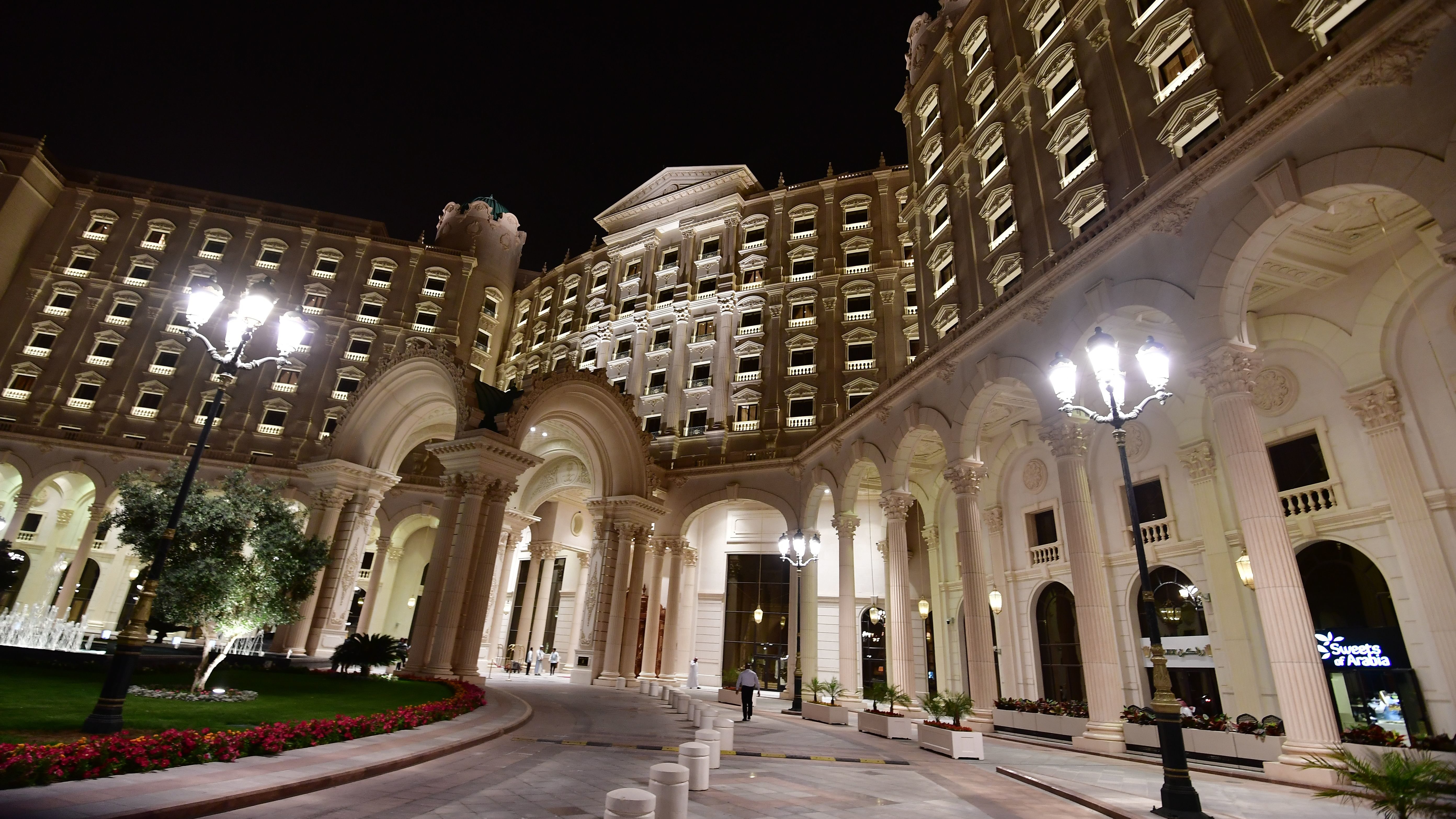
Saudis to Allow Unmarried Tourist Couples to Share Hotel Rooms
- My View My View
- Following Following
- Saved Saved
Saudi Arabia allows foreign men and women to share hotel rooms
- Medium Text
Reporting by Stephen Kalin; Editing by Daniel Wallis
Our Standards: The Thomson Reuters Trust Principles. New Tab , opens new tab
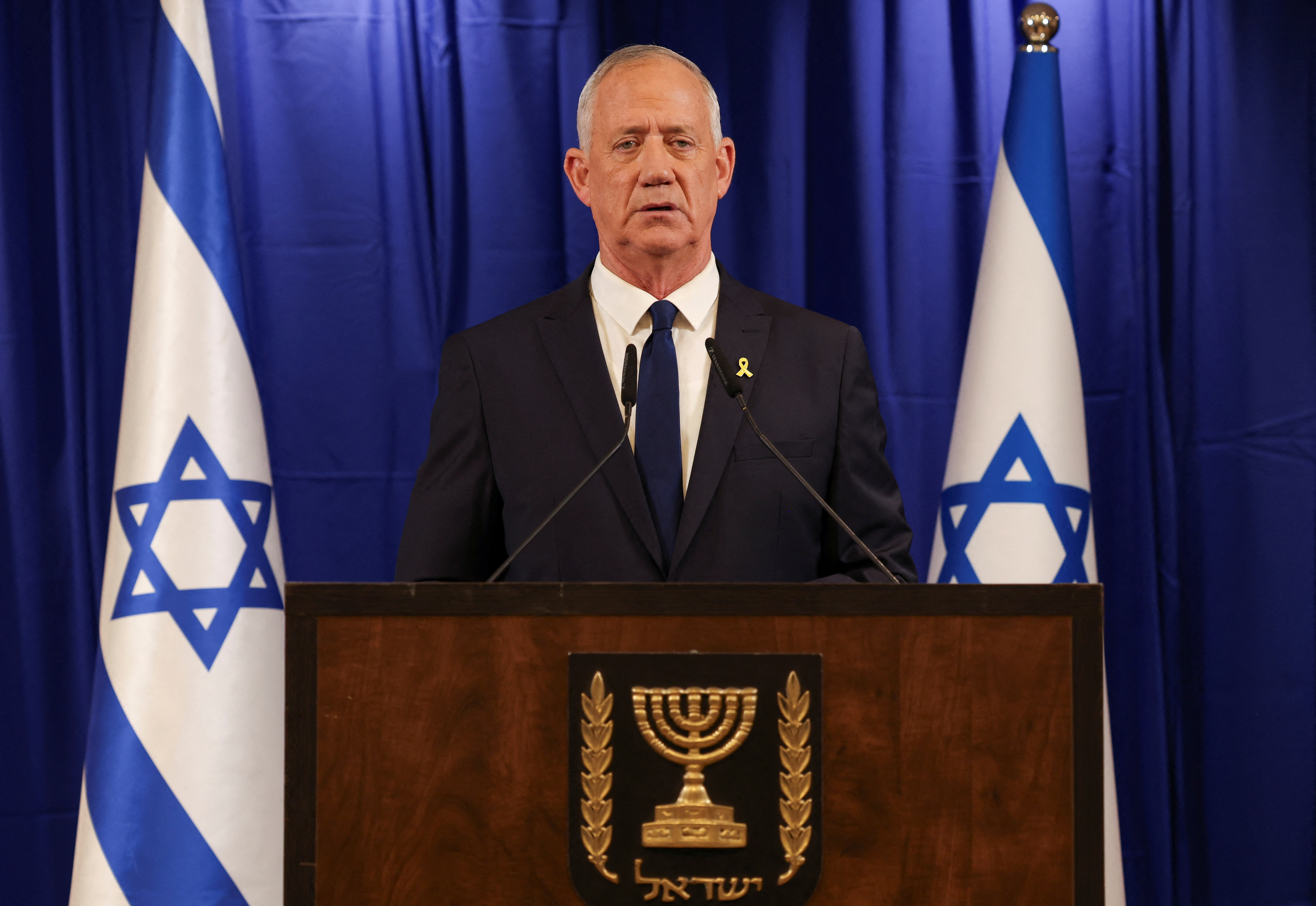
World Chevron
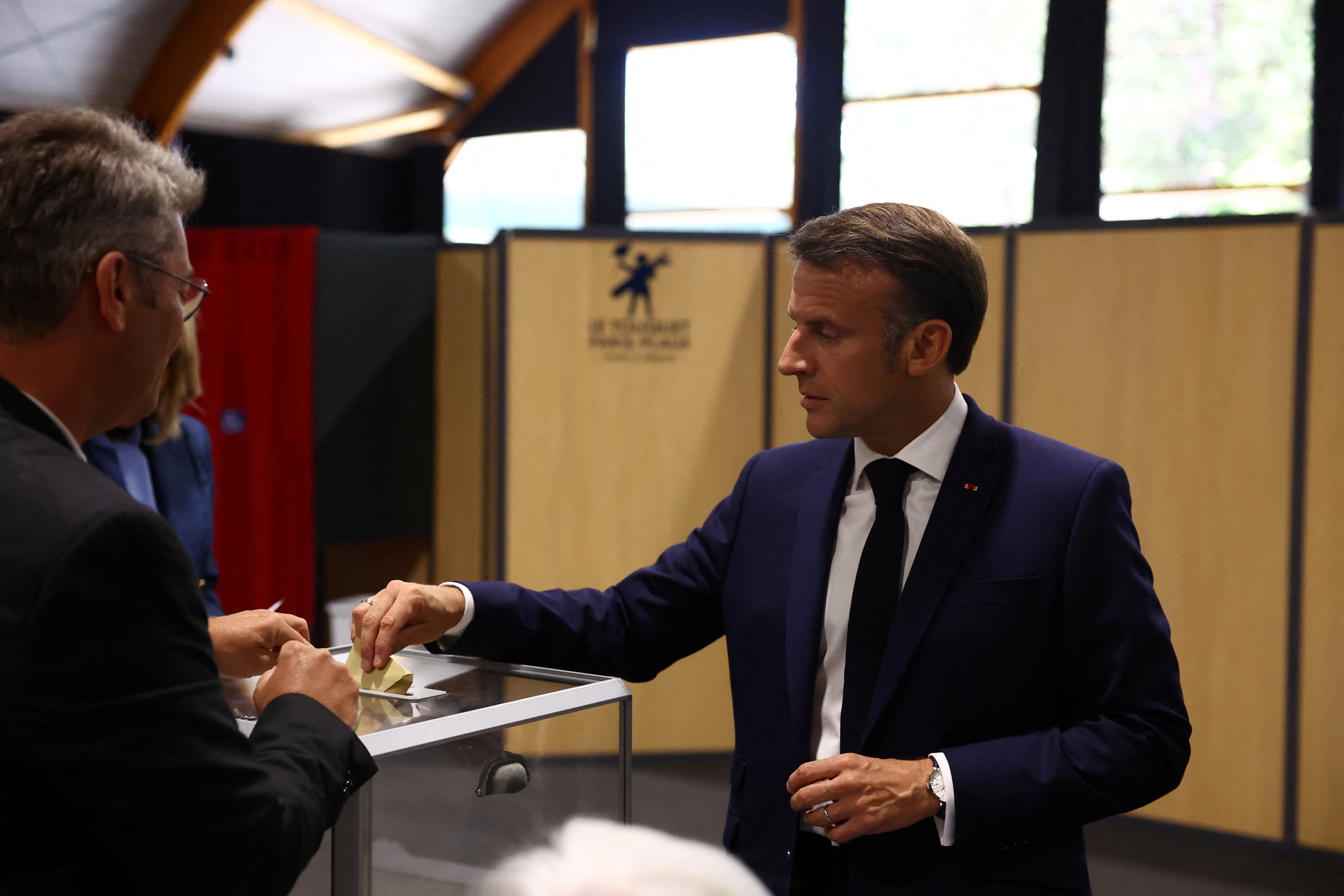
Macron calls shock French elections after far-right rout by Le Pen
In a shock move, French President Emmanuel Macron on Sunday said he would dissolve parliament and call new legislative elections later this month after he was trounced in European elections by Marine Le Pen's far-right party.

- Subscribe Now
Saudi Arabia allows unmarried foreign couples to rent hotel rooms together
Already have Rappler+? Sign in to listen to groundbreaking journalism.
This is AI generated summarization, which may have errors. For context, always refer to the full article.
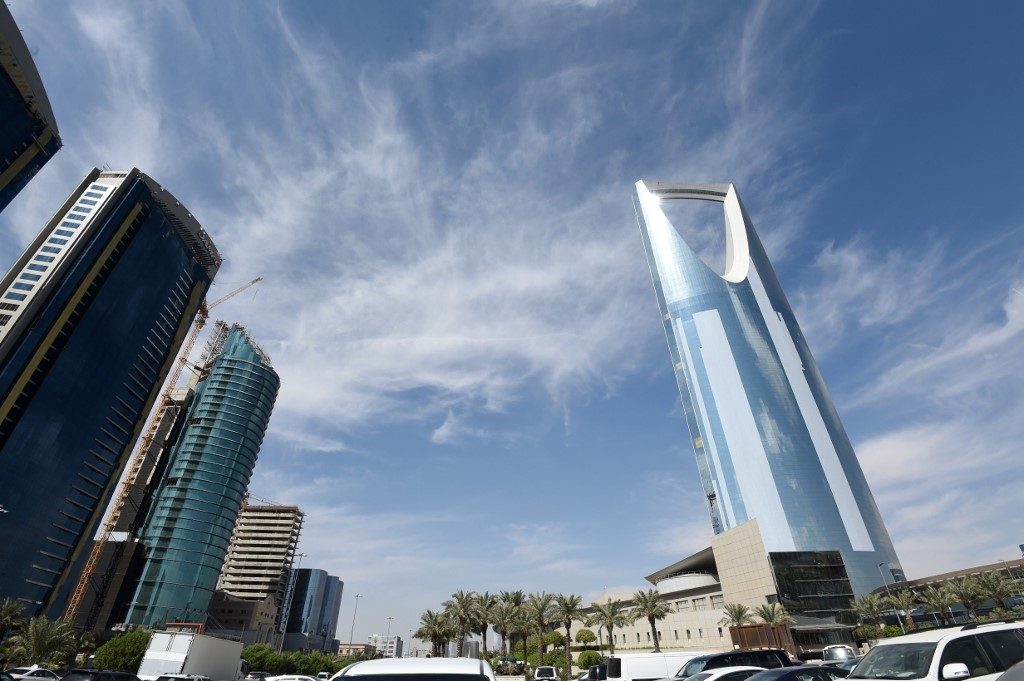
RIYADH, Saudi Arabia – Saudi Arabia announced on Sunday, October 6, it would allow unmarried foreign couples to rent hotel rooms together as the ultraconservative kingdom begins offering up tourist visas for the first time.
The tourism authority said in a statement published on Twitter that Saudi women traveling alone would also be able to check into a hotel by presenting valid ID.
In the past, couples wanting to stay in a hotel had to prove they were married.
“This is no longer required for tourists,” the statement said.
Saudi Arabia announced on September 27 it was opening its doors to holidaymakers with the goal of diversifying its oil-dependent economy.
The kingdom had previously only issued visas to Muslim pilgrims, foreign workers, and recently to spectators at sporting or cultural events.
Kickstarting tourism is one of the centerpieces of Crown Prince Mohammed bin Salman’s Vision 2030 reform program to prepare the biggest Arab economy for a post-oil era.
Citizens from 49 countries are now eligible for online e-visas or visas on arrival, including the United States, Australia and several European nations.
On September 28, Saudi authorities warned that tourists who violated “public decency”, including with immodest clothing and public displays of affection, would be subject to fines. – Rappler.com
Add a comment
Please abide by Rappler's commenting guidelines .
There are no comments yet. Add your comment to start the conversation.
How does this make you feel?
Related Topics
Recommended stories, {{ item.sitename }}, {{ item.title }}.
Checking your Rappler+ subscription...
Upgrade to Rappler+ for exclusive content and unlimited access.
Why is it important to subscribe? Learn more
You are subscribed to Rappler+
- Share full article

Stephen Hiltner/The New York Times
The sculpted facade of a 2,000-year-old tomb glows in the late-afternoon sun at Hegra, a UNESCO World Heritage site.
Crowds of Muslim pilgrims gather outside the Prophet’s Mosque in Medina.
Camels march through the desert on the outskirts of the Empty Quarter, the world’s largest sand sea.
For many years these Saudi Arabian scenes, including the lively open-air markets in Jeddah, were off limits to most travelers.
But not anymore. As it undergoes a profound transformation, Saudi Arabia is spending lavishly to lure tourists with its luxe new resorts ...
... its rich cultural heritage ...
... and its sublime natural beauty.
Can the Saudi government persuade would-be visitors to look past — or reconsider — its longstanding associations with religious extremism, ultraconservatism and human rights abuses?
Will the kingdom’s $800 billion bet on tourism pay off?
Supported by
Surprising, Unsettling, Surreal: Roaming Through Saudi Arabia
To witness the kingdom’s profound transformation and assess its ambitious tourism projects, a Times journalist spent a month on the road there. Here’s what he saw.

By Stephen Hiltner
An editor and photojournalist for the Travel section, Stephen Hiltner drove 5,200 miles and visited all 13 of Saudi Arabia’s provinces while reporting and shooting this story.
Wandering alone along the southern fringes of Saudi Arabia’s mountainous Asir Province, some eight miles from the Yemeni border, in a nondescript town with a prominent sculpture of a rifle balanced on an ornately painted plinth, I met a man, Nawab Khan, who was building a palace out of mud.
Actually, he was rebuilding the structure, restoring it. And when I came across him, he hadn’t yet begun his work for the day; he was seated on the side of the road beneath its red-and-white windows — cross-legged, on a rug, leaning over a pot of tea and a bowl of dates.
Two weeks earlier, on the far side of the country, a fellow traveler had pointed at a map and described the crumbling buildings here, in Dhahran al-Janub, arranged in a colorful open-air museum. Finding myself nearby, I’d detoured to have a look — and there was Mr. Khan, at first looking at me curiously and then waving me over to join him. Sensing my interest in the cluster of irregular towers, he stood up, produced a large key ring and began opening a series of padlocks. When he vanished through a doorway, I followed him into a shadowy stairwell.
This, of course, was my mother’s worst nightmare: Traveling solo, I’d been coaxed by a stranger into an unlit building in a remote Saudi village, within a volatile border area that the U.S. Department of State advises Americans to stay away from .
By now, though, more than halfway through a 5,200-mile road trip, I trusted Mr. Khan’s enthusiasm as a genuine expression of pride, not a ploy. All across Saudi Arabia, I’d seen countless projects being built, from simple museums to high-end resorts. These were the early fruits of an $800 billion investment in the travel sector, itself part of a much larger effort, Vision 2030 , to remake the kingdom and reduce its economic dependence on oil.
But I’d begun to see the building projects as something else, too: the striving of a country — long shrouded to most Westerners — to be seen, reconsidered, accepted. And with its doors suddenly flung open and the pandemic behind us, visitors like me were finally beginning to witness this new Saudi Arabia, much to Mr. Khan’s and all the other builders’ delight.

Few countries present as complicated a prospect for travelers as Saudi Arabia.
Long associated with Islamic extremism, human rights abuses and the oppression of women, the kingdom has made strides in recent years to refashion its society and its reputation abroad.
The infamous religious police, which upheld codes of conduct based on an ultraconservative interpretation of Islam, were stripped of their power. Public concerts, once banned, are now ubiquitous. Women have been granted new rights — including the freedom to drive and to travel without permission from a male guardian — and are no longer required to wear floor-length robes in public or to cover their hair.
These changes are part of a broad set of strategies to diversify the kingdom’s economy, elevate its status in the world and soften its image — the last of which is a tall order for a government that has killed a newspaper columnist , kidnapped and tortured dissidents , precipitated a humanitarian crisis in Yemen and imprisoned people for supporting gay rights , among a number of other recent abuses .
Central to the transformations led by 38-year-old Crown Prince Mohammed bin Salman, the kingdom’s de facto ruler, is a major push for international visitors. It represents a sea change in a country that, until 2019, issued no nonreligious tourist visas and instead catered almost exclusively to Muslim pilgrims visiting Mecca and Medina, Islam’s two holiest cities. In February, by contrast, my tourist e-visa was approved online in minutes.
Saudi Arabia has already transformed one of its premier destinations — Al-Ula, with its UNESCO-listed Nabatean tombs — from a neglected collection of archaeological sites into a lavish retreat with a bevy of activities on offer, including guided tours, wellness festivals, design exhibitions and hot air balloon rides.
Another project will create a vast array of luxury resorts on or near the Red Sea.
Still more projects include the development of Diriyah , the birthplace of the first Saudi state; the preservation and development of the coastal city of Jeddah ; an offshore theme park called the Rig ; and Neom , the futuristic city that has garnered the lion’s share of attention.
All told, the country is hoping to draw 70 million international tourists per year by 2030, with tourism contributing 10 percent of its gross domestic product. (In 2023, the country logged 27 million international tourists, according to government figures , with tourism contributing about 4 percent of G.D.P.)

At-Turaif, a UNESCO World Heritage site, was the birthplace of the kingdom of Saudi Arabia. It is now the centerpiece of the $63 billion Diriyah project, a new center of culture just outside Riyadh.
Nujuma, a Ritz-Carlton Reserve on a remote island in the Red Sea, opened in late May. (A one-bedroom villa costs about $2,500 per night, excluding taxes and fees.) It is one of 50 properties scheduled to open in the area by 2030.
The preservation and development of Jeddah, a coastal city famous for its historic district built largely from blocks of coral, comes with a price tag of some $20 billion.
Al-Ula is a cornerstone of Saudi Arabia’s tourism ambitions. Part of the city’s Old Town, long crumbling in neglect, has now been painstakingly restored.
To get a sense of these projects and the changes unfolding in Saudi society, I spent a month exploring the kingdom by car. I traveled alone, without a fixer, driver or translator. Per New York Times ethics guidelines, I declined the government’s many offers of discounts and complimentary services.
Much of the time I felt I’d been tossed the keys to the kingdom. But there were moments, too, when I faced a more complicated reality, one epitomized by a road sign that forced me to abruptly exit the highway some 15 miles from the center of Mecca. “Obligatory for Non Muslims,” it read, pointing to the offramp.
To me, the sign broadcast the lines being drawn to compartmentalize the country, which is now marketing itself to two sets of travelers with increasingly divergent — and sometimes contradictory — expectations: luxury tourists at ease with bikinis and cocktails, and pilgrims prepared for modesty and strict religious adherence. It’s hard to know whether the kingdom can satisfy both without antagonizing either.
My trip began in Jeddah, where, after spending two days exploring its historic district, I rented a car and drove eight hours north to Al-Ula, a benchmark for the new Saudi tourism initiatives.

Saudi Arabia
Reporter’s route
Dhahran al-Janub

Wadi al-Disah
Red Sea Resort
The name Al-Ula refers to both a small city and a broader region packed with attractions: Hegra , the kingdom’s first UNESCO World Heritage site and its biggest archaeological draw, is a 30-minute drive north of Old Town, a maze of crumbling mud-brick buildings now partly restored. Between the two, and fanning out to the east and west, are several other archaeological sites, as well as a smattering of resorts, event spaces and adventure outfitters. Farther northeast, beyond Hegra, is the Sharaan Nature Reserve , a vast protected zone used for conservation efforts.
My first priority during my five-day stay in Al-Ula was a visit to Hegra.
Like Petra , its better-known counterpart in Jordan, Hegra was built by the Nabateans, an ancient people who flourished 2,000 years ago. The site contains more than 100 tombs that were carved from solid rock, their entrances adorned with embellishments. Most impressive among them, set apart and standing some 70 feet tall, is a tomb colloquially called the Lonely Castle.
Not long ago, visitors could hire private guides and wander the area on foot, climbing in and out of — and no doubt damaging — the many tombs. Not anymore: I boarded an air-conditioned tour bus and zipped past most of them, stopping at just four locations.
At the penultimate stop, we exited the bus and trudged several hundred feet along a sandy path to the front of the Lonely Castle. Even in the late afternoon, the heat was stifling. I craned my neck to take in the details of the sculpted facade, which emerged like a mirage from one side of a massive boulder: its four pilasters, the rough chisel marks near the bottom, its characteristic five-stepped crown. Ten minutes evaporated, and I turned to find my group being shepherded back onto the bus. I jogged through the sand to catch up.
A few miles north of Hegra, I hopped in the back of a Toyota Land Cruiser — accompanied by an Italian graduate student and his mother — for a drive through the sandy expanse of the Sharaan Nature Reserve.
The scenery was sublime: Slipping through a narrow slot canyon, we emerged into a vast, open desert plain, then settled into a wide valley enclosed by an amphitheater of cliffs. Occasionally our guide stopped and led us on short hikes to petroglyphs, some pockmarked by bullet holes, or to lush fields of wildflowers, where he plucked edible greens and invited us to sample their lemony tang.
Gabriele Morelli, the graduate student, had first come to Al-Ula a few years ago — a different era, he said, given how quickly the place had transformed. He described a version that no longer exists, rife with cheap accommodation, lax rules and a free-for-all sensibility.
Some of the changes, of course, have been necessary to protect delicate ecosystems and archaeological sites from ever-growing crowds. But several people I met in Al-Ula — Saudis and foreigners alike — quietly lamented the extent of the high-end development and the steady erosion of affordability. Many of the new offerings, like the Banyan Tree resort, they pointed out, are luxury destinations that cater to wealthy travelers.
These hushed criticisms were among my early lessons on how difficult it can be to gauge the way Saudis feel about the pace and the pervasiveness of the transformations reshaping their society.
I got a taste of Al-Ula’s exclusivity — and of the uncanniness that occasionally surfaced throughout my trip — at a Lauryn Hill concert in an event space called Maraya . To reach the hall, I passed through a security gate, where an attendant scanned my e-ticket and directed me two miles up a winding road into the heart of the Ashar Valley, home to several high-end restaurants and resorts.
Rounding the final bend, I felt as if I’d stumbled into a computer-generated image: Ant-size humans were dwarfed by a reflective structure that both asserted itself and blended into the landscape. Inside, waiters served hors d’oeuvres and brightly colored mocktails to a chic young crowd.
The surreality peaked when, midway through the show, I left my plush seat to join some concertgoers near the stage — only to turn and see John Bolton, former President Donald J. Trump’s national security adviser, seated in the front row.
Where else, I wondered, could I attend a rap concert in the middle of the desert with a longtime fixture of the Republican Party — amid a crowd that cheered when Ms. Hill mentioned Palestine — but this strange new corner of Saudi Arabia?

The mirrored facade at Maraya, a vast event space in Al-Ula, warps and reflects the surrounding desert landscape.
The building is in some ways a precursor to the kingdom’s most ambitious architectural design: the project at Neom called the Line, a 106-mile linear city that will also feature a mirrored surface.
Lauryn Hill performing in front of a large crowd at Maraya.
After Al-Ula, I drove to another of the kingdom’s extravagant schemes: the Red Sea project, billed as the “world’s most ambitious regenerative tourism destination.” After weaving through a morass of construction-related traffic, I boarded a yacht — alongside a merry band of Saudi influencers — and was piloted some 15 miles to a remote island, where I disembarked in a world of unqualified opulence at the St. Regis Red Sea Resort .
I was chauffeured around in an electric golf cart — past 43 beachside “dune” villas and onto two long boardwalks that connect the rest of the resort to 47 “coral” villas, built on stilts over shallow turquoise water. Along the way, I listened to Lucas Julien-Vauzelle, an executive assistant manager, wax poetic about sustainability. “We take it to the next level,” he said, before rattling off a list of facts and figures: 100 percent renewable energy, a solar-powered 5G network , plans to enhance biologically diverse habitats.
By 2030, he said, the Red Sea project will offer 50 hotels across its island and inland sites. Citing the Maldives, he mentioned the kingdom’s plans to claim a share of the same high-end market.
Another prediction came by way of Keith Thornton, the director of restaurants, who said he expects the resort to legally serve alcohol by the end of the year. (While a liquor store for non-Muslim diplomats recently opened in Riyadh, the Saudi government has made no indication that it plans to reconsider its broader prohibition of alcohol.)
The hotel was undeniably impressive. But there’s an inescapable irony to a lavish resort built at unfathomable expense in the middle of the sea — with guests ferried out by chartered boat and seaplane — that flaunts its aspirations for sustainability.
Toward the end of my several-hour visit, I learned that every piece of vegetation, including 646 palm trees, had been transplanted from an off-site nursery. Later, reviewing historical satellite images, I found visual evidence that the island — described to me as pristine — had been dramatically fortified and, in the process, largely remade. Its footprint had also been significantly altered. It was, in a sense, an artificial island built where a smaller natural island once stood.
Something else struck me, too: The place was nearly empty, save for the staff and the Saudi influencers. Granted, the resort had just opened the month before — but the same was true at the nearby Six Senses Southern Dunes , an inland Red Sea resort that opened in November. Fredrik Blomqvist, the general manager there, told me that its isolated location in a serene expanse of desert — part of its appeal — also presented a challenge in drawing customers. “The biggest thing,” he said, “is to get the message out that the country is open.”
Since the country began issuing tourist visas, influencers have been documenting their experiences in places like Jeddah and Al-Ula, their trips often paid for by the Saudi government. Their breezy content contributes to the impression that the kingdom is awaiting discovery by foreign visitors with out-of-date prejudices. To an extent, for a certain segment of tourists, that’s true.
For many travelers, though, the depiction of the kingdom as an uncomplicated getaway could be dangerously misleading.
Speech in Saudi Arabia is strictly limited; dissent is not tolerated — nor is the open practice of any religion other than the government’s interpretation of Islam. In its travel advisory , the U.S. Department of State warns that “social media commentary — including past comments — which Saudi authorities may deem critical, offensive, or disruptive to public order, could lead to arrest.” Punishment for Saudi nationals has been far worse: In 2023, a retired teacher was sentenced to death after he criticized the ruling family via anonymous accounts. As of late 2023, he remained in prison.
Other restrictions are harder to parse. L.G.B.T.Q. travelers are officially welcome in the kingdom but face a conundrum: They might face arrest or other criminal penalties for openly expressing their sexual orientation or gender identity. As recently as 2021, an independent U.S. federal agency included Saudi Arabia on a list of countries where same-sex relationships are punishable by death , noting that “the government has not sought this penalty in recent years.”
When asked how he would convince a same-sex couple that it was safe to visit, Jerry Inzerillo, a native New Yorker and the group chief executive of Diriyah, said: “We don’t ask you any questions when you come into the country or when you leave.”
“Maybe that’s not conclusive enough,” he added, “but a lot of people have come.”
Female travelers might also face difficulties, since advancements in women’s rights are not equally distributed throughout the kingdom.
The changes were more visible in big cities and tourist centers. Ghydda Tariq, an assistant marketing manager in Al-Ula, described how new professional opportunities had emerged for her in recent years. Maysoon, a young woman I met in Jeddah, made extra money by occasionally driving for Uber. Haneen Alqadi, an employee at the St. Regis Red Sea, described how women there are free to wear bikinis without fear of repercussions.
Outside such places, though, I sometimes went for days without seeing more than a handful of women, invariably wearing niqabs, let alone seeing them engaged in public life or tourism. My photographs reflect that imbalance.
As an easily identifiable Western man, I moved through the country with an array of advantages: the kindness and cheery curiosity of strangers, the ease of passage at military checkpoints, and the freedom to interact with a male-dominated society at markets, museums, parks, restaurants, cafes. Not all travelers could expect the same treatment.
Roaming in the far north and south, I often found the earlier version of the kingdom — with lax rules and less development — that had been described to me in Al-Ula.
I trekked to the northern city of Sakaka to see an archaeological site promoted as the Stonehenge of Saudi Arabia: a set of monoliths called the Rajajil Columns thought to have been erected some 6,000 years ago but about which little is definitively known.
My heart sank when I pulled into the parking lot after a five-hour drive and found the columns blocked by a tall fence. Approaching on foot, though, I noticed that a section of the fence had been peeled back and that visitors were wandering freely among the stones, which protruded from the earth like isolated clusters of crooked teeth. I joined the small crowd, if hesitatingly, and was surprised to find no footpaths, nor anything to keep us a safe distance from the columns. In the end I wondered if our access had been officially approved or informally arranged.
My travel experiences were sometimes awkward in other ways, too.
Standing just outside the grounds of the central mosque in Medina, where the Prophet Muhammad is buried, I was detained by a stern member of the Special Forces. (Even after 2019, non-Muslim tourists remained barred from Mecca and Medina, Islam’s two holiest cities. The ban was relaxed in parts of Medina in 2021.)
The guard interrogated me and, after calling a colleague to confer, demanded that I leave the area. “Go,” he said threateningly. Another traveler who witnessed the encounter scurried away to avoid a similar fate.
The unsettling exchange cast a pall over my time in the city, which few non-Muslims have seen. As far as I knew, I’d abided by the rules by staying outside the grounds of the Prophet’s Mosque — a boundary line that I’d confirmed with tourism officials beforehand.

Peering through the perimeter fence — the boundary line for non-Muslims — at the Prophet’s Mosque in Medina.
The Mosque of Al-Ghamamah, one of the oldest in the holy city.
A sprawling maze of ramshackle residential buildings sits less than a mile from the Prophet’s Mosque.
A guide speaking to a group of visitors near the Hejaz Railway Museum, visible in the distance. (The museum was closed for renovations at the time.)
A group of young men, most of whose families emigrated from Sudan, playing soccer in a field just outside the center of Medina.
More than anything, family and friends wanted to know if I felt safe on my trip — and I did, almost without exception. Petty crime in Saudi Arabia is exceedingly rare. And while parts of the country are under a Level 4 “Do Not Travel” advisory , even my rambling itinerary was approved by a security expert.
Instead of fearing for my safety, I was often preoccupied with how I’d fairly portray a place that elicited such a range of conflicting emotions: joy and distress, excitement and apprehension, sincerity and doubt. So much lay hidden from public view — like the collective anguish over the war raging in Gaza . And so little was easy to categorize, in part because the warmth of everyday Saudis was strikingly at odds with the ruthlessness of their authoritarian government.
In Riyadh, a young man warned me not to speak openly with strangers. “People get arrested here for a tweet ,” he said. “Can you imagine?”
I could, actually. The Saudi columnist Jamal Khashoggi had chronicled his government’s increasingly draconian responses to criticism. “Repression and intimidation are not — and never should be — the acceptable companions of reform,” he wrote in The Washington Post in 2018, just months before he was killed and dismembered at his country’s consulate in Istanbul.

Were we to travel only where we feel comfortable and unchallenged, we’d all be poorer for it. But the question of whether to travel to Saudi Arabia is thornier than that.
It’s easy to see one response, “No,” as yielding to closed-mindedness at the expense of ordinary people — like the kindly vendor Abdullah, who served me local honey at his shop in the southern mountains.
But it’s easy, too, to see “Yes” as an affirmation that might makes right, that amusement outweighs morality, that princely wealth can wipe a stained slate clean.

Sunrise over the mountainous village of Fayfa, some six miles from the Yemeni border.
Abdullah Ghaleb Zaid, a honey vendor, at his shop atop a mountain pass near the southern city of Abha.
Sunset near Jabal Soudah, the kingdom’s highest peak.
Ten days into my trip, I ventured to Wadi al-Disah, a steep-walled valley where I’d booked a tent at a campsite I found on Airbnb. For an additional 300 riyals ($80), my host, Faisal, led me on a four-wheel-drive tour, departing the paved road and weaving through a path along the bed of an ephemeral river. Continually jolted by the uneven terrain, we eased past thick reeds, lofty palms and small bands of visitors who’d nestled into clearings.
As we left, I met a group of young men gathered for a picnic, their sandals scattered around a carpet on which they were preparing their dinner. Delighted to meet an American with a camera, they asked if I’d take a group portrait, then exchanged information with me so I could send them a copy — a scenario by then so familiar that I hardly thought anything of it.
A full day later, some 200 miles away, I was cruising along a lonely highway near the Jordanian border when a Land Cruiser blew past me at an astonishing speed. I felt my compact car rock from its turbulence — and then I watched with a twinge of dread as the car abruptly braked, slowing hard in the left lane until our front ends were aligned. It held steady there.
For a moment I stared straight ahead, hoping to avoid a confrontation. When I finally turned to look, I saw a group of boys grinning wildly and waving through an open window. Then I realized: Improbably, it was three of the young men I’d met the day before. Somehow we’d all followed the same route. And somehow, in the split second it took them to fly past, they’d recognized me. I lifted my camera from the passenger seat and snapped a photograph.
The picture shows three young Saudis on a precipice: endearing, erratic, captivating. I have a sense of where they came from but no certainty about where they’re going. Two are flashing peace signs, and none appears to be wearing a seatbelt. No one is watching the road as their car drifts out of its lane, careening a little recklessly into a hopeful and uncertain future.
Stephen Hiltner’s recent work includes a photo essay about his childhood in Budapest , an examination of A.I.-generated guidebooks and an investigation into the deaths of Russian soldiers in Ukraine . You can follow his travels on Instagram .
Got a question about this story? Drop a note in the comments section. Got a tip? Send him an email .
Stephen Hiltner is an editor, writer and photographer for the Travel section of The Times. More about Stephen Hiltner
Open Up Your World
Considering a trip, or just some armchair traveling here are some ideas..
52 Places: Why do we travel? For food, culture, adventure, natural beauty? Our 2024 list has all those elements, and more .
The Alaska Highway: On an epic road trip, a family plots a course from Alaska to the Lower 48, passing through some of Canada’s most spectacular scenery .
Minorca: Spend 36 hours on this slow-paced Spanish island , which offers a quieter and wilder retreat than its more touristy neighbors.
Japan: A new high-speed train stop unlocks Kaga, a destination for hot springs, nourishing food and traditional crafts , as an easy-to-reach getaway from Tokyo.
London: The Victoria and Albert Museum is a treasure trove of art and design. Here’s one besotted visitor’s plan for taking it all in .
Advertisement

- Firstpost Defence Summit
- Entertainment
- Web Stories
- Health Supplement
- First Sports
- Fast and Factual
- Between The Lines
- Firstpost America

Cristiano Ronaldo moves to Saudi Arabia with partner Georgina Rodriguez: Are unmarried couples allowed to live together?
Authorities in Saudi Arabia will ‘turn a blind eye’ to Cristiano Ronaldo and his partner Georgina Rodriguez. The kingdom doesn’t allow unmarried couples to live together but will make an exception for the 37-year-old football superstar, who signed a deal worth millions with the club Al-Nassr
)
When football superstar Cristiano Ronaldo announced his move to Saudi Arabia’s Al-Nassr FC , a lot was spoken about the ‘more than €200 million (Rs 1,758 crore) deal’. While sports pundits spoke about the probable end of Ronaldo’s football career, there were others who wondered if the deal would pose a problem for the 37-year-old from a family perspective.
Many wondered if Ronaldo would be forced to stay away from his family, owing to Saudi Arabia’s strict rules on unmarried couples. Ronaldo and Georgina Rodriguez have been together since 2016 and even have two children together — Bella and Alana and also raise Cristiano’s near-five-year-old twins Eva and Mateo born to a surrogate mother and the football pro’s 12-year-old son Cristiano Jr. But the duo haven’t tied the knot. However, the Saudi authorities have bent their rules and permitted the footballer to live together with Rodriguez.
It has been reported that local authorities will turn a “blind eye” to the couple cohabiting even though the law forbids unmarried couples from living together. A lawyer was quoted as saying, ““The Saudi Arabian authorities, today, do not interfere in this matter (in the case of foreigners), but the law continues to prohibit cohabitation outside of marriage.”
As Ronaldo now settles in with his family in Saudi Arabia, let’s take a closer look at what the Kingdom’s rules are on unmarried couples.
What’s allowed and not for unmarried couples?
In Saudi Arabia, unmarried couples aren’t allowed to live together, nor are they allowed to share hotel rooms. According to the laws, when checking in, hotels are required by law to obtain the Saudi national IDs of the couple and ensure that the Mahram relation (married) exists between them. Moreover, if a couple seeks to rent an apartment, the landlord is required to ensure that the tenants are married.
These rules were applicable to Saudi nationals as well as expatriates. However, in October 2019, the Kingdom stated that unmarried couples would be allowed to share rooms while on vacation in the country. The Saudi authorities had also allowed for foreign women travelling alone to book rooms for themselves — something that the Kingdom hadn’t allowed since then. Authorities, however, had said that women will still be expected to dress modestly.
Due to the laws on sex outside marriage, if you become pregnant outside marriage, both you and your partner could face imprisonment and/or deportation. Doctors will ask for proof of marriage during antenatal checks.
An unmarried woman who gives birth in Saudi Arabia may also encounter problems when registering the birth of the child in Saudi Arabia, and could be arrested, imprisoned or deported. To get a birth certificate from the Saudi authorities, you must provide a marriage certificate and the authorities may compare the date of the marriage against the estimated date of conception.
Also read: Where do Kuwait, Qatar, Saudi Arabia and Iran stand on minority rights and religious freedom?
Women’s rights in Saudi Arabia
The Saudi Crown Prince, Mohammed bin Salman, has in recent times introduced reforms when it comes to women’s rights. Many note that the changes are part of the crown prince’s plan to modernise the Middle Eastern country.
However, despite the reforms that enabled women to get their own passports, as well as travel abroad and live independently without the permission of a male guardian, or “wali” and even drive, the Kingdom continues to be incredibly prohibitive on what women can and cannot do.
As Megan K Stack wrote for the New York Times in August 2022, “The reforms means that if a woman has been born or married into a clan of freethinking men willing to let her do things, the State will not interfere. But for the many Saudi women who lack a benevolent male guardian, there is no remedy. If, for example, a woman’s husband or father doesn’t think she should get her driving licence, she will still compelled to obey his diktat.”
When it comes to women’s reproductive rights, the country still lags behind. A male guardian’s approval is still required in order for a woman to seek a legal abortion in Saudi Arabia. The law permits abortion only on the basis of health or therapeutic grounds, according to the Center for Reproductive Rights.
Also, a closer look at the marriage laws in Saudi Arabia show just how difficult life is for women. Saudi women still need permission from a male charge to marry. It is true that the guardian can’t force the woman to marry against their will. Also, once married, a Saudi woman must obey her husband. She may not “withhold herself” from her husband. She must breastfeed her children; this is a legal obligation owed to her husband. Moreover, she can’t marry a non-Muslim and widows are entitled to a smaller share of their spouse’s estate.
In the justice system, women are openly discriminated against. One man’s court testimony is equal to that of two women.
Lina al-Hathloul, who works as head of communications and monitoring for the London-based human rights watchdog ALQST, was quoted as telling DW , “The liberation of women’s rights over the past four years doesn’t come anywhere close to what Saudi women really want.
“We want to live without fear and be able to demand our own rights,” she said.
With inputs from agencies
Read all the Latest News , Trending News , Cricket News , Bollywood News , India News and Entertainment News here. Follow us on Facebook , Twitter and Instagram .
Find us on YouTube

Related Stories
)
Al Nassr's Cristiano Ronaldo handed one-match ban for obscene gesture in Saudi league match
)
Saudi Arabia executes 5 Yemeni nationals for killing fellow national, 'forming gang to rob and steal'
)
‘Let’s make history’: At WTO, Israel and Saudi Arabia push for normalisation amid Gaza War
)
Watch: Cristiano Ronaldo makes obscene gesture to Lionel Messi chants, draws criticism
)

IMAGES
COMMENTS
Unmarried couples will now be allowed to share rooms while on vacation in the country. "The Saudi Commission for Tourism and National Heritage has recently approved the new regulations of ...
Unmarried Tourists couples. According to the new rules applicable in Saudi Arabia, unmarried couples on a tourist visa can live together in a hotel room. The hotel management would ask you to provide passport copies. But they are not obliged to check if you are in a marital relationship. How to apply for a tourist visa? Source: BBC.
Saudi Arabia is to allow foreign men and women to share hotel rooms without proving they are married. In a move away from its traditionally strict social code and in order to grow its tourism ...
Foreign couples can now share Saudi hotel rooms 10/06/2019 October 6, 2019. Male and female tourists in Saudi Arabia can now sleep in the same hotel room without proof of marriage, the kingdom's ...
C ouples retreats just got a whole lot easier in Saudi Arabia…if taking a couples retreat in Saudi Arabia is your thing. As part of its new, more relaxed visa program, the famously restrictive country is now allowing unmarried foreign couples to rent hotel rooms together.Previously, couples had to provide documents proving that they were married before renting a room.
7 October 2019. Unmarried foreign couples will be allowed to rent hotel rooms together in Saudi Arabia for the first time as part of a wider drive to boost the tourism sector. Having revealed a ...
For the first time, the Saudi Kingdom will open its country up to mass tourism thanks to the launch of a new tourist visa program. In an effort to appeal to tourists, Saudi Arabia is now allowing unmarried couples to share rooms while visiting the country.
Fayez Nureldine | AFP | Getty Images. Saudi Arabia will relax its rules to allow unmarried men and women to share hotel rooms, as the country opens up to international tourism in a bid to ...
Saudi couples are still required to share a family ID or proof of relationship upon checking into the same hotel room, according to the Saudi Commission for Tourism and National Heritage. However, foreign and Saudi women are now allowed to rent hotel rooms by themselves in a bid to ease movement and travel regulations for female visitors to the ...
Last month, the Saudi Kingdom announced the launch of a new tourist visa program, opening up the country to mass tourism for the first time. Saudi Arabia allows unmarried couples to share hotel ...
6 Oct 2019. Saudi Arabia has lifted some restrictions on women travelling in the kingdom, with new guidelines allowing women to rent hotel rooms without a male guardian present, and foreign men ...
The rules for holidaymakers in Saudi Arabia. Strict laws on hotel bookings for unmarried foreign couples are being dropped as part of bid to boost tourism. The government of Saudi Arabia has ...
102 reviews. 55 helpful votes. Hotel room for an unmarried couple. 4 years ago. We like travelling and exploring the world, have visited different countries in the Middle East and with the new eVisa for Saudi Arabia we are very interested in visiting the country. But we are an unmarried couple.
Stephen Kalin/Reuters. Saudi Arabia introduced a new tourist visa last week. It is now allowing unmarried foreign men and women to rent hotel rooms together, and letting women rent hotel rooms by ...
In a move seen as an attempt to further promote tourism to Saudi Arabia, authorities will now allow unmarried tourist couples to stay in the same hotel room. Trusted Mideast News. Saturday 02/25/2023. Donate. Search. About. Today. Personalize. Categories. Saved. Archive. Light Theme. ... Saudi Arabia. unmarried couples. Vision 2030.
Saudi Arabia is allowing foreign men and women to rent hotel rooms together without proving they are related, after the conservative Muslim kingdom launched a new tourist visa regime to attract ...
Saudi Arabia announced Sunday it would allow unmarried foreign couples to rent hotel rooms together as the ultraconservative kingdom begins offering up tourist visas for the first time.
Saudi women traveling alone would also be able to check into a hotel by presenting a valid ID
Saudi Arabia. Saudi Arabia is a highly gender-segregated country. Homosexuality is illegal and punishable by death. It's one of the harshest countries with conservative laws. Pre-marital sex is ...
It's advertising to welcome LGBTQ tourists and unmarried couples in the country. Advertisement. Saudi Arabia has ambitious plans to expand its tourism industry in the years to come. However, the country has a reputation problem among travellers. Riyadh is a different tale than Dubai. Thus, the country is trying to change that.
An editor and photojournalist for the Travel section, Stephen Hiltner drove 5,200 miles and visited all 13 of Saudi Arabia's provinces while reporting and shooting this story. June 5, 2024 ...
Many wondered if Ronaldo would be forced to stay away from his family, owing to Saudi Arabia's strict rules on unmarried couples. Ronaldo and Georgina Rodriguez have been together since 2016 and even have two children together — Bella and Alana and also raise Cristiano's near-five-year-old twins Eva and Mateo born to a surrogate mother and the football pro's 12-year-old son Cristiano Jr.